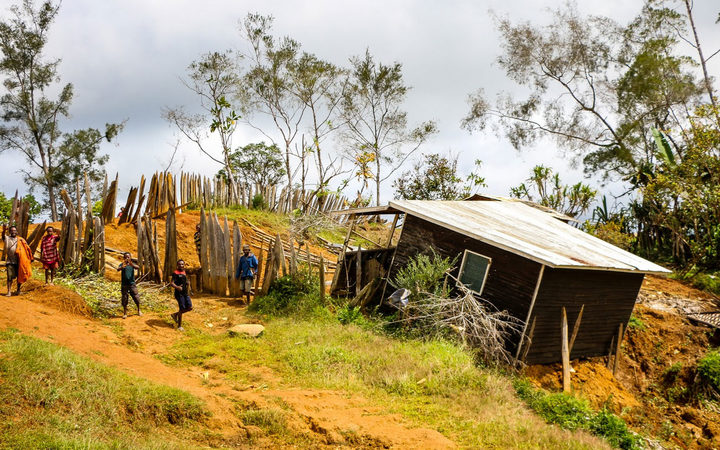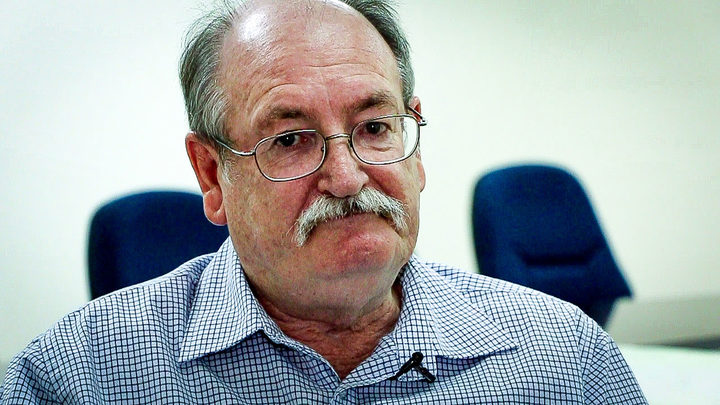
By Lucy EJ Woods - Mongabay
- Much of Papua New Guinea remains inaccessible by road and the existing roads are often in poor condition.
- While lack of road access has historically helped to keep ecosystems intact, it comes with both social and environmental downsides.
- Some communities are negotiating with resource extraction companies who promise to provide roads and other needed services. Lack of infrastructure also hampers efforts to monitor and protect the environment.
- Some NGOs, whose work suffers from difficult and expensive travel to project areas, call for carefully planned expansion of the road network.
The four-wheel-drive is king of the road in Papua New Guinea. Driving anywhere outside the capital, Port Moresby, is a whiplash roulette of swerving around zigzag crevices and blindsiding potholes.
When the Australian government, a primary source of infrastructure aid funding for PNG, evaluated PNG’s road management from 2007-2017, it found almost 60 percent of national roads to be “in very poor condition.”
This included sections of PNG’s sparse highways. Although the Pacific island nation is about the size of California, and has as many people as Switzerland (8 million), it has just three highways. These highways pass through PNG’s central provinces. None lead to, or from, Port Moresby, colloquially referred to as “Pom.”
This lack of road access makes it difficult for rural schools, hospitals and other services to receive supplies and staff. It also leaves the 80 percent of PNG’s population that live in rural areas stranded and isolated from essential services. “When people are sick, many people walk, and they die while walking to reach medical services,” says Kenn Mondai, executive director of local conservation NGO Partners with Melanesians (PwM).
The underdeveloped road systems also put environmental NGOs in a bind. Such groups rarely advocate for road construction, which is linked to forest fragmentation and biodiversity loss. In PNG, however, they find themselves backing the maintenance and construction of paved roads. Here, the lack of vehicular access is so acute it limits the abilities of environmental groups to reach remote rural communities and to conserve wildlife.
The scarce infrastructure “sure makes the job harder,” says Peter Dam from FORCERT, an NGO that works with forest communities in PNG.
The only way for NGOs to reach people, is “by plane or road,” says Kafuri Yaro, a conservation officer for WWF PNG.
The lack of transport choices leaves NGOs saddled with a heavy conscience and a steep bill: forking out for carbon-intensive jeeps to tackle the barely there, broken roads, or for even more carbon-intensive, expensive and sometimes dangerous helicopter and light aircraft flights.
“The biggest challenge we face is access to places by our officers,” says Mondai. “Most of our money goes on the travel logistics to get into the project areas, the fuel costs for the cars is very, very, high.” Mondai says the average cost of gasoline is $1.70 per liter. (It’s 85 cents in the U.S.)
PwM struggles to reach its projects in the 3,600-square kilometer (1,390-square mile) Managalas Conservation Area in Oro Province.
The journey from Pom requires a light-aircraft flight to the capital of Oro province, Popondetta, which costs around 1,600 kina ( $474) for a roundtrip. Then it’s a 100-kilometer (60-mile) drive over crumbling or non-existent tarmac in an off-road vehicle.
With gas and flight prices rising, NGOs require generous donations to fund the complex logistics required to navigate PNG’s roadless terrains. And these funds are disappearing.
Environmental NGOs face a multitude of issues in PNG, from kidnapping and death threats to a shortage of legal, scientific and management expertise. But Dam and Yaro both say funding pullouts are the primary, major cause of NGO troubles.

Environmental NGOs in PNG are usually funded by external donors and philanthropists with interests in protecting PNG’s immense biodiversity. Recently, however, there has been “a shift” in these vital donations, leaving NGOs fraught, says Yaro.
In 2014, Greenpeace halted 17 years of activism in PNG, reportedly because of donors pulling out.
The local WWF office has also faced funding challenges, and decided to downsize, from several, well-staffed offices, to just two: one in Pom and one in Madang. “We were affected by funding. We’ve only had four staff since 2012, and really struggled the last five years,” says Yaro.
Local NGOs, including Eco Forestry Forum, and the Environmental Law Centre (founded by Goldman Environmental Prize winner Annie Kajir) have also scaled back or ceased operations in recent years. Today there is “a limited number of local environmental NGOs, and that is a bit of a concern, that the NGO movement has gone down,” says Dam.
When Dam began working in PNG with FORCET, back in 1985, “there were all these organizations that were doing the ground work,” says Dam, “it was almost a height of the NGO movement.”
But over the last decade, “they all fell over,” says Dam.
While there are many complex reasons NGOs can collapse, environmental NGOs in PNG “just don’t survive without donors,” says Yaro.
With conservation officers prevented from reaching places that need protection because of the lack of roads, and campaigns failing because they cannot fund the high logistics costs, illegal loggers take their chances. Logging in the perimeters of the protected Managlas Plateau is an ongoing challenge, Mondai says. PwM conservation officers “cannot reach the areas,” as adequate monitoring “can only be effectively done if the road is maintained.”

Currently, as reported previously by Mongabay, the strategy for road infrastructure employed by PNG’s government, is to seek aid from logging companies, mining and other extractive industries.
Roads in PNG are “built purposely for logging operations. Because of this, we have seen faster losses in forest area, and degradation,” says Mondai. “Animals are disturbed and many disappear or go away, due to the disturbance from chainsaw engines, trucks and bulldozers.”
This includes bird species such as the cockatoo and hornbill, which require old, hollow trees to lay their eggs – the same trees that are removed by loggers. “It is sad. Birds like these are unique. They always use the same tree for breeding year after year,” says Mondai.
To conserve PNG’s protected areas and its endemic species, any road development plans, “must consider the forest and biodiversity,” says Mondai, who recommends planned, “specialized,” roads that meet strict environmental assessment standards.
Providing tailored, environmentally focused road access will open up alternatives to relying on the extractive industries for infrastructure in PNG.
“Roads provides choices – choices to refuse logging and mining,” says Dam.
Identifying where and how sustainable infrastructure can be developed to maximize benefits to people who need road access most, while still conserving the environment, is a key task for NGOs, Dam says. And despite the potholes along the way, he says the few NGOs that remain dedicated and persistent in PNG will continue working “to find the balance between the spiritual interests of the people, the social-economic interests, and environmental interests.”
Go to this link for more: https://news.mongabay.com/2019/06/bumpy-ride-for-conservation-in-png-as-lack-of-roads-hinders-activities/


